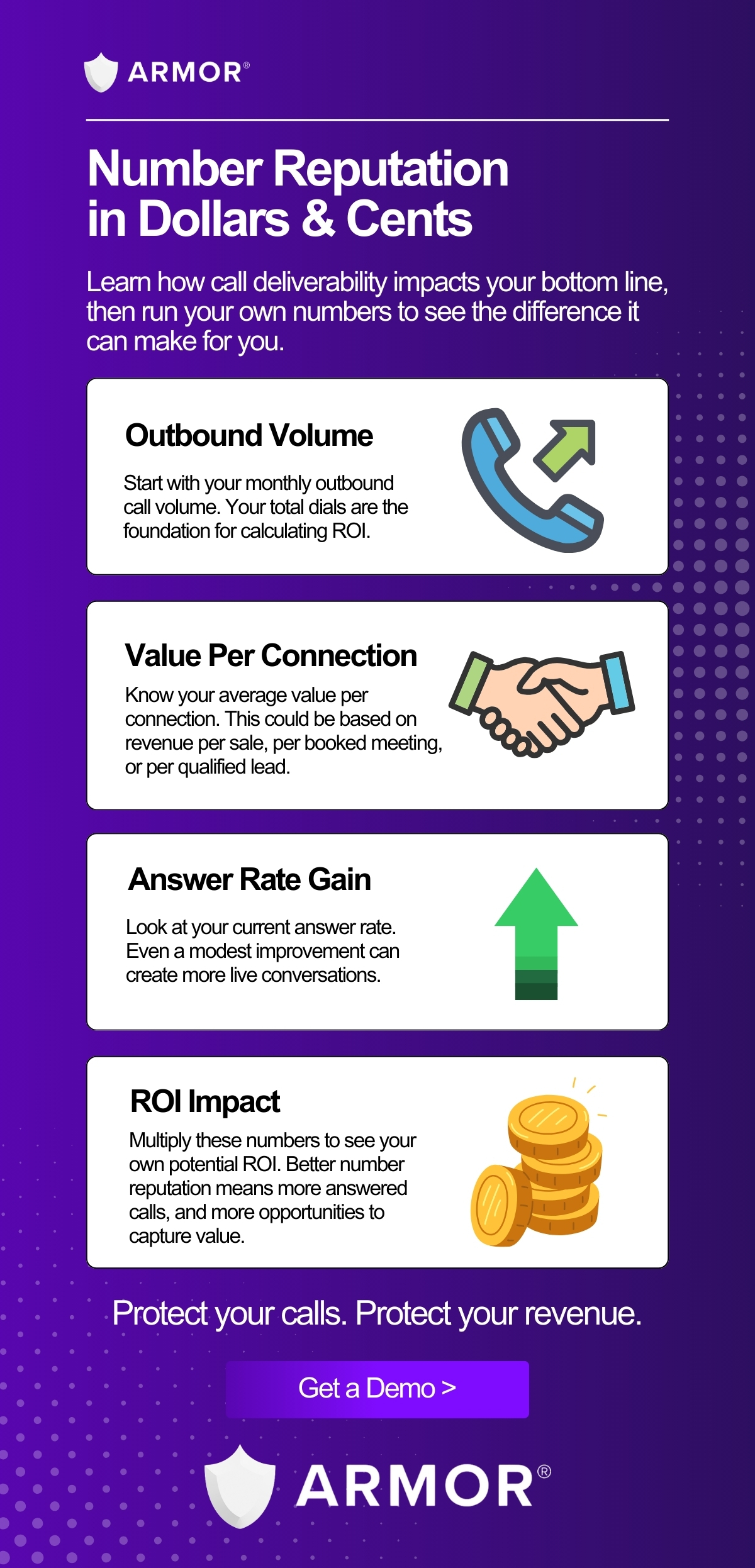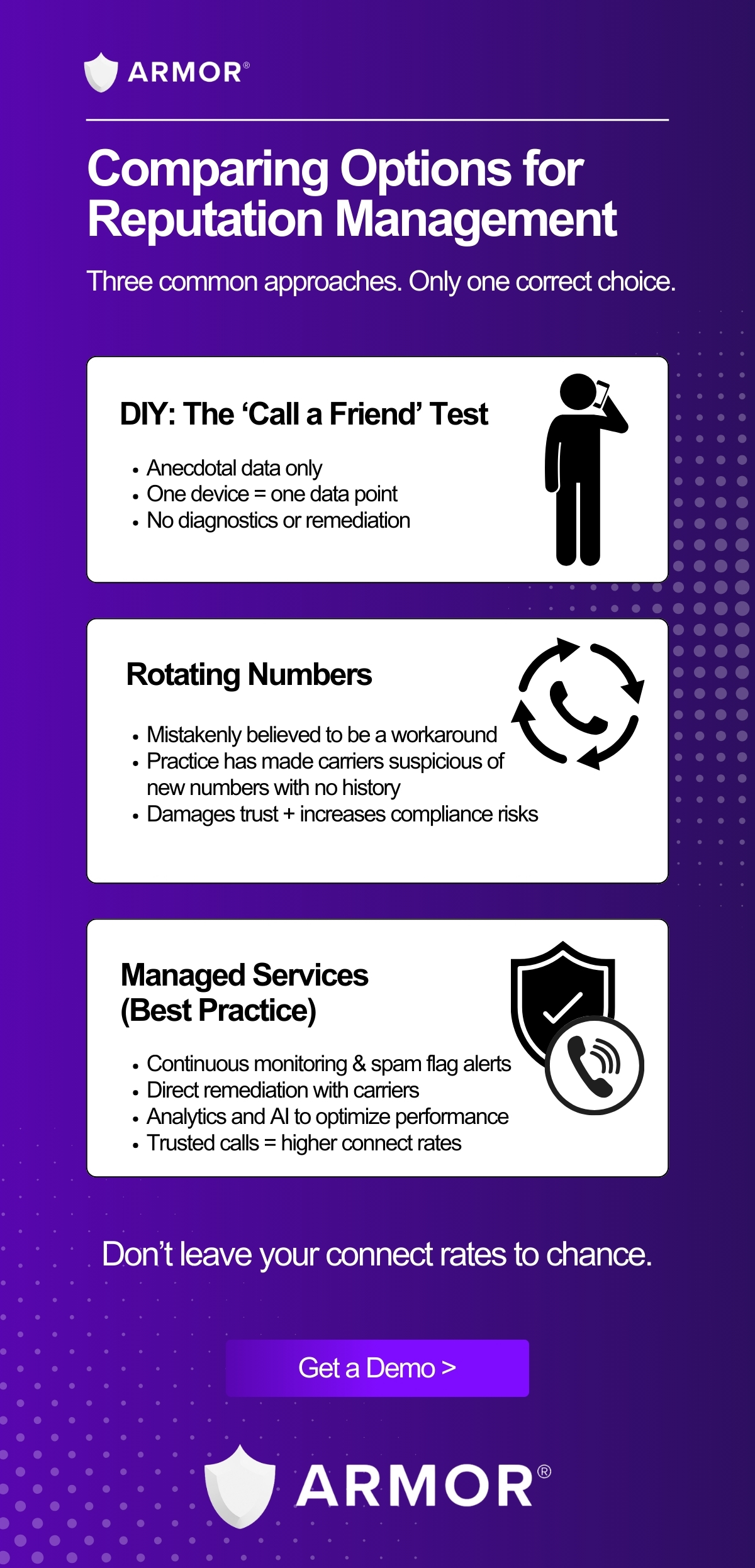

Call reputation management services monitor, protect, and restore caller ID reputation to improve call deliverability and quality connections while reducing the risk of outbound calls being mislabeled as spam. With consumer trust at an all-time low, answer rates depend on verified numbers and proactive remediation. Options like DIY testing or number rotation fall short, but managed solutions offer visibility, direct carrier support, and compliance benefits. This can help prevent legitimate calls from being ignored.
Answer rates make or break outbound sales teams, and false spam flags will kill them. If your number is mistakenly labeled as Spam Likely or Scam Risk, your chances of starting a conversation with a prospect plummet.
Many organizations turn to call reputation management services to help mitigate these risks, improve number reputation, and dial with greater confidence and success. But what do these services actually do, and how do you choose the right one?
We developed ARMOR® to stop caller ID issues from costing legitimate businesses. Below, our experts show you what a high-value reputation management service should do for you, how it pays for itself, and the costs of not acting to protect your numbers.
Reputation management services are designed to monitor, protect, and help restore your outbound caller IDs, as well as optimize your overall call deliverability. Not every reputation management service is equal, but a strong one should:
The goal is to give you confidence that when your team dials you’re dialing with trusted numbers and engaging in call behaviors that optimize engagement and your potential for successful interactions.
When number reputation declines, the consequences go far beyond a few missed connections.
Caller ID reputation is a direct signal of how carriers, analytics engines, and even prospects perceive your business. If that perception turns negative, it creates ripple effects that impact performance, compliance, and team morale.
Note: the stats mentioned below where relevant come from PhoneBurner’s Spam and Scam Call Economic Impact Report. Explore it to learn more.
In short, poor number reputation doesn’t just make it harder to get prospects on the phone. It strains budgets, damages brand equity, undermines compliance, and chips away at the confidence of the very people making the calls. Protecting your numbers is protecting your business.

Improving caller ID reputation doesn’t just help you get more calls answered. It can also meaningfully influence your team’s productivity and revenue potential. But there’s no universal number that applies to every business.
Instead of promising specific percentages or revenue gains, think of number reputation as a multiplier on the work your reps are already doing. Better deliverability means more of the calls you’ve already invested in actually reach prospects, giving you:
To understand the potential impact for your organization, start by looking at a few of your own metrics:
Then ask: “What would it mean for our team if more of those calls were answered?” Even modest improvements can add up quickly when applied to thousands of calls per month.
Learn More About Analyzing Your Data
Important: Results will vary by industry, lead quality, sales process, and campaign strategy. Number reputation management does not guarantee a specific lift in answer rates or revenue, but it does put you in the best position to maximize the value of every dial your team makes.

It’s tempting to believe that you won’t have to worry about number reputation as long as you aren’t actively making spam calls, but that isn’t true. The reality is:
Carriers have grown skeptical of ‘new’ phone numbers because scammers abused number rotation. That means lasting success comes not from swapping numbers, but from managing reputation: building credibility with established numbers and reinforcing it through smart calling practices. This is what drives stronger deliverability, higher answer rates, and better call outcomes.
Achieving that requires a comprehensive solution, and that’s exactly what ARMOR® was built for.

If you’re trying to protect your caller ID, you’ve likely considered a few approaches. We’ve written in more depth about these elsewhere, but here’s an overview of the main ones:
Some businesses still rely on the “call a friend” test, where they dial a contact they know to see how their number displays. This method provides only anecdotal data and no ability to remediate issues. You can see the limits for yourself in our full article on this topic: Calling a Friend vs. Spam Checkers.
Another tactic is swapping numbers frequently to stay ahead of spam flags. This is mistakenly believed to be a short-term fix, but it’s actually counterproductive.
See Also: How to Build a Trusted Number & Avoid Potential Spam Call Labels
Managed reputation services go beyond testing. They provide the visibility, remediation, and insights needed to keep outbound performance on track for the long-term. Instead of guessing, swapping numbers, or reacting after problems surface, you get proactive protection, ongoing monitoring, and direct carrier support to identify and clear false flags. This gives sales teams confidence that every call has the best chance of connecting.
That’s the role of ARMOR®.
ARMOR® isn’t just another number reputation management service. It’s a full protection package that combines technology, carrier relationships, and compliance expertise. Here’s what sets it apart:
Ask yourself:
If the answer to any of these is yes, it’s time to consider a managed solution like ARMOR®.
Call reputation management services aren’t a luxury; they’re a necessity in today’s outbound environment. DIY methods and number rotation leave too much to chance, and incomplete tools create a false sense of security. With ARMOR®, you get the full package: monitoring, remediation, proactive protection, and cutting-edge analytics that support higher connect rates, stronger compliance, and greater revenue confidence.
Get a demo of ARMOR® today and see how your numbers are really showing up for prospects.